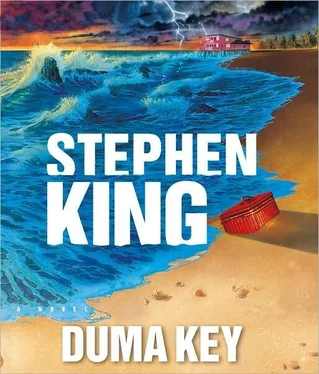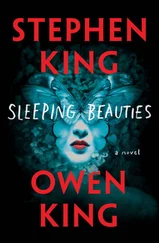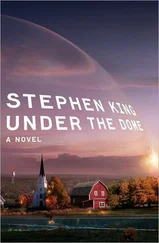“You know what, I think she will,” Ilse said, “She’ll be crazy to see what you’re doing that’s got people in the know so excited. Will you get written up?”
“My friend Wireman thinks so. One-armed artist, and all that.”
“But you’re just good, Daddy!”
I thanked her, then moved on to Carson Jones. Asked what she heard from him.
“He’s fine,” she said.
“Really?”
“Sure — why?”
“I don’t know. I just thought I heard a little cloud in your voice.”
She laughed ruefully. “You know me too well. The fact is, they’re SRO everyplace they play now — word’s getting around. The tour was supposed to end on May fifteenth because four of the singers have other commitments, but the booking agent found three new ones. And Bridget Andreisson, who’s become quite the star, got them to push back the start of her understudy pastorate in Arizona. Which was lucky.” Her voice flattened as she said this last, and became the voice of some adult woman I didn’t know. “So instead of finishing in mid-May, the tour has been extended to the end of June, with dates in the Midwest and a final concert at the Cow Palace in San Francisco. Some bigga-time, huh?” This was my phrase, used when Illy and Lin were little girls putting on what they called “ballet super-shows” in the garage, but I couldn’t recall ever saying it in that sad tone of not-quite-sarcasm.
“Are you worried about your guy and this Bridget?”
“No!” she said at once, and laughed. “He says she has a great voice and he’s lucky to be singing with her — they have two songs now instead of just one — but she’s shallow and stuck-up. Also, he wishes she’d pop some Certs before he has to, you know, share a mike with her.”
I waited.
“Okay,” Ilse said at last.
“Okay what?”
“Okay, I’m worried.” A pause. “A little bit, because he’s with her on a bus every day and on stage with her every night and I’m here.” Another, longer pause. Then: “And he doesn’t sound the same when I talk to him on the phone. Almost… but not quite.”
“That could be your imagination.”
“Yes. It could. And in any case, if something’s going on — nothing is, I’m sure nothing is — but if something is, better now rather than after… you know, than after we…”
“Yes,” I said, thinking that was so adult it hurt. I remembered finding the picture of them at the roadside stand with their arms around each other, and touching it with my missing right hand. Then rushing up to Little Pink with Reba clamped between my stump and my right side. A long time ago, that seemed. I love you, Punkin! “Smiley” had written, but the picture I’d done that day with my Venus colored pencils (they also seemed a long time ago) had somehow mocked the idea of enduring love: the little girl in her little tennis dress, looking out at the enormous Gulf. Tennis balls all around her feet. More floating in on the incoming waves.
That girl had been Reba, but also Ilse, and… who else? Elizabeth Eastlake?
The idea came out of nowhere, but I thought yes.
The water runs faster now, Elizabeth had said. Soon come the rapids. Do you feel that?
I felt it.
“Daddy, are you there?”
“Yes,” I said again. “Honey, be good to yourself, okay? And try not to get too spun up. My friend down here says in the end we wear out our worries. I sort of believe that.”
“You always make me feel better,” she said. “That’s why I call. I love you, Daddy.”
“I love you too.”
“How many bunches?”
How many years since she’d asked that? Twelve? Fourteen? It didn’t matter, I remembered the answer.
“A million and one for under your pillow,” I said.
Then I said goodbye and hung up and thought that if Carson Jones hurt my daughter, I’d kill him. The thought made me smile a little, wondering how many fathers had had the same thought and made the same promise. But of all those fathers, I might be the only one who could kill a heedless, daughter-hurting suitor with a few strokes of a paintbrush.
Dario Nannuzzi and one of his partners, Jimmy Yoshida, came out the very next day. Yoshida was a Japanese-American Dorian Gray. Getting out of Nannuzzi’s Jaguar in my driveway, dressed in faded straight-leg jeans and an even more faded Rihanna Pon De Replay tee-shirt, long black hair blowing in the breeze off the Gulf, he looked eighteen. By the time he got to the end of the walk, he looked twenty-eight. When he shook my hand, up close and personal, I could see the lines tattooed around his eyes and mouth and put him somewhere in his late forties.
“Pleased to meet you,” he said. “The gallery is still buzzing over your visit. Mary Ire has been back three times to ask when we’re going to sign you up.”
“Come on in,” I said. “Our friend down the beach — Wireman — has called me twice already to make sure I don’t sign anything without him.”
Nannuzzi smiled. “We’re not in the business of cheating artists, Mr. Freemantle.”
“Edgar, remember? Would you like some coffee?”
“Look first,” Jimmy Yoshida said. “Coffee later.”
I took a breath. “Fine. Come on upstairs.”
I’d covered my portrait of Wireman (which was still little more than a vague shape with a brain floating in it three-quarters of the way up), and my picture of Tina Garibaldi and Candy Brown had gone bye-bye in the downstairs closet (along with Friends with Benefits and the red-robe figure), but I had left my other stuff out. There was now enough to lean against two walls and part of a third; forty-one canvases in all, including five versions of Girl and Ship .
When their silence was more than I could bear, I broke it. “Thanks for the tip on that Liquin stuff. It’s great. What my daughters would call da bomb.”
Nannuzzi seemed not to have heard. He was going in one direction, Yoshida in the other. Neither asked about the big, sheet-draped canvas on the easel; I guessed that doing that might be considered poor etiquette in their world. Beneath us, the shells murmured. Somewhere, far off, a Jet-ski blatted. My right arm itched, but faint and very deep, telling me it wanted to paint but could wait — it knew the time would come. Before the sun went down. I’d paint and at first I would consult the photographs clipped to the sides of the easel and then something else would take over and the shells would grind louder and the chrome of the Gulf would change color, first to peach and then to pink and then to orange and finally to RED, and it would be well, it would be well, all manner of things would be well.
Nannuzzi and Yoshida met back by the stairs leading down from Little Pink. They conferred briefly, then came toward me. From the hip pocket of his jeans, Yoshida produced a business-size envelope with the words SAMPLE CONTRACT/SCOTO GALLERYneatly typed on the front. “Here,” he said. “Tell Mr. Wireman we’ll make any reasonable accommodation in order to represent your work.”
“Really?” I asked. “Are you sure?”
Yoshida didn’t smile. “Yes, Edgar. We’re sure.”
“Thank you,” I said. “Thank you both.” I looked past Yoshida to Nannuzzi, who was smiling. “Dario, I really appreciate this.”
Dario looked around at the paintings, gave a little laugh, then lifted his hands and dropped them. “I think we should be the ones expressing appreciation, Edgar.”
“I’m impressed by their clarity,” Yoshida said. “And their… I don’t know, but… I think… lucidity . These images carry the viewer along without drowning him. The other thing that amazes me is how fast you’ve worked. You’re unbottling.”
Читать дальше










